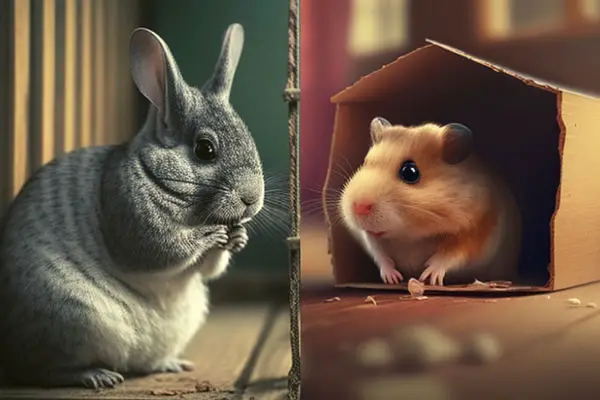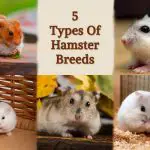Chinchilla Vs Hamster: Which One To Choose As A Pet?
When it comes to choosing a furry friend as a pet, you have a tough decision to make between Chinchillas and Hamsters. Both of these adorable creatures have their own unique quirks and personalities, making them equally endearing.
So the question remains, Chinchilla vs Hamster: which one to choose as a pet? The choice between Chinchillas and Hamsters ultimately comes down to personal preference and lifestyle. Chinchillas are social animals that love to play, whereas hamsters are nocturnal and mischievous and love to hoard food in their cheeks.
So, whether you’re looking for a long-term commitment or a quick fix of cute, take a look at this article! There’s a pet out there that’s perfect for you; choose wisely!
Chinchilla Vs Hamster: Which One To Choose As A Pet?
When it comes to choosing between a chinchilla and a hamster, there are several factors to consider. Here are some things to keep in mind. The comparison of chinchillas vs hamsters as pets:

| Difference | Chinchilla | Hamster |
|---|---|---|
| Lifestyle | Active, social, requires attention and interaction | Low-maintenance, less interaction required |
| Living conditions | Need a large cage | Can live in smaller cages |
| Noise level | Vocal, may make noise, especially at night | Quiet, but nocturnal |
| Diet | Herbivores, high-fiber diet | Omnivores, variety of foods |
| Interactivity | Social animals, best kept in pairs | Solitary animals, kept in separate cages |
| Lifespan | 15-20 years | 2-3 years |
Lifestyle
Chinchillas are outgoing, lively creatures who need a lot of connection and care. They’re fantastic for anyone who spends a lot of time at home and want a pet they can bond with and play with.
Hamsters, on the other hand, are low-maintenance and don’t need as much interaction, so they’re a wonderful choice for individuals who are busy or don’t have a lot of time to spend to pet care.

Living conditions
Chinchillas need a lot of room to move around, so they require a large cage.
Hamsters, on the other hand, can live in smaller cages, making them a good choice for people with limited space.
Noise-level
Chinchillas can be quite vocal and may make a lot of noise, especially at night. Hamsters are generally quiet, but they are nocturnal, so they may be more active at night.
Diet
Chinchillas are herbivores and require a high-fiber diet, while hamsters are omnivores and can eat a variety of foods.

Interactivity
Hamsters should be kept in separate cages since they are solitary creatures, but chinchillas are sociable creatures and should be kept in pairs. Moreover, chinchillas like playing and are more social than hamsters.
In summary, chinchillas and hamsters are excellent pets for several reasons. When picking which pet is best for you, it’s crucial to take your lifestyle, living situation, and personal preferences into account.
Physical Characteristics: Chinchilla vs Hamster
Let’s look at this table for a further elaboration of the physical characteristics of chinchillas and hamsters:
| Physical Characteristic | Chinchillas | Hamsters |
|---|---|---|
| Size | 12 to 14 inches in length, including tail | 4 to 8 inches in length, including tail |
| Weight | 600 to 1400 grams | 100 to 300 grams |
| Appearance | Soft, dense fur in gray to black; large, round ears; small, beady eyes; bushy, fluffy tail | Short, stocky bodies; small faces; short tails; distinctive cheek pouches that can puff up |
| Coat Type | Soft and dense, can range in color from light gray to black | Agouti, cream, black, white, or other colors |
| Lifespan | 15 to 20 years in captivity | 2 to 3 years, with some species living longer |
Size and Weight of Chinchillas and Hamsters
Chinchillas: Chinchillas are relatively large rodents, weighing anywhere between 600 to 1400 grams and measuring about 12 to 14 inches in length, including their tails.

Hamsters: They are much smaller, with most species weighing between 100 to 300 grams and measuring between 4 to 8 inches in length, including their tails.
Appearance and Coat Types
Chinchillas: They have soft, dense fur that can range in color from light gray to black. They have large, round ears and small, beady eyes, and their tails are bushy and fluffy.
Hamsters: Hamsters come in a variety of colors and coat types, including agouti (black and brown banded fur), cream, black, and white. Their cheeks are distinctive and can puff up significantly when they store food in their cheek pouches.
The lifespan of Chinchillas and Hamsters
Chinchillas: Chinchillas have a long lifespan of around 15 to 20 years in captivity. With proper care, they can live long and healthy life.
Hamsters: The lifespan of a hamster in captivity is usually 2 to 3 years, although some species may live longer.

Dwarf hamsters, for example, have an average lifespan of 2 to 3 years, while Syrian hamsters tend to live a bit longer, with an average lifespan of 2.5 to 3 years.
Comparison of Chinchilla and Hamster Temperament
Regardless of the fact that hamsters and chinchillas are both energetic and active creatures, there are some distinctions in their personalities and temperaments. Hamsters are lonely creatures who like to be left alone, but chinchillas are outgoing animals that love associating with other chinchillas and their owners.

Aggression
Chinchillas are generally gentler and more affectionate than hamsters and are less likely to bite or show aggression. On the other hand, hamsters are more active at night, while chinchillas are more active during the day.
Training
Both chinchillas and hamsters are capable of being trained and developing strong bonds with their owners. Due to their outgoing and curious temperament, chinchillas are often easier to teach.
Chinchillas are also known for their cleanliness and are very easy to care for. Compared to other pets, hamsters are noted for hoarding food and making more mess.
To know more, here’s a YouTube video
Chinchilla vs Hamster Pros/Cons
We shall now see some pros and cons of having a chinchilla vs hamster for your ease to pick a pet:
Chinchillas as Pets

Pros
- Low Maintenance: Chinchillas are clean and low-maintenance pets that do not require frequent grooming or baths.
- Active and Playful: They are active and playful, making them fun and entertaining to watch.
- Long Life Span: They have a long life span and can live for up to 15 years, making them a great long-term commitment.
- Soft and Cuddly: Chinchillas have soft and dense fur that makes them cuddly and enjoyable to hold.
Cons
- High Price: Chinchillas can be expensive to purchase and their cages and accessories are a bit costly.
- Sensitive: Chinchillas are sensitive to temperature changes and high levels of noise and can become stressed easily.
- Specialized Diet: Chinchillas have a specialized diet that requires specific foods and fresh hay.
- High Energy: They have a lot of energy and need plenty of room to play and exercise.
Hamsters as Pets

Pros
- Affordable: Hamsters are relatively inexpensive pets to purchase and maintain, making them accessible to many people.
- Low Space Requirements: Hamsters are small and do not require a lot of space, making them suitable for apartment living.
- Easy to Care For: Hamsters are relatively easy to care for and do not require a lot of attention.
- Nighttime Activity: Hamsters are nocturnal, meaning they are active at night, making them suitable for people who work during the day.
Cons
- Short Life Span: Hamsters have a relatively short lifespan of 2-3 years, meaning that they may not be a suitable long-term commitment.
- Fragile: Hamsters are fragile and can be easily injured, requiring special care when handling.
- Bite Risk: Hamsters have a tendency to bite when they feel threatened, which may not be suitable for families with young children.
- Cage Cleaning: Hamsters produce a lot of waste and their cages need to be cleaned frequently to maintain their health and well-being.
FAQs
Let’s take a look at some commonly asked questions that you too might have regarding chinchillas or hamsters.
Q: Can Chinchillas Or Hamsters Live Alone?
While hamsters are solitary animals and make the best living alone, chinchillas are social animals and do best when kept in pairs.
Q: What Kind Of Cage Is Best For A Chinchilla Versus A Hamster?
You can give your hamster a small cage since they are small creatures and don’t require enough space. On the other hand, chinchillas require larger, multi-level cages with plenty of space for climbing and playing.
Q: Can Chinchillas Or Hamsters Be Handled Easily?
Chinchillas are generally calmer and easier to handle than hamsters, but both can become skittish and nippy if not handled properly. It’s essential to handle them gently and regularly from a young age to help them become comfortable with human interaction.
Conclusion
Both chinchillas and hamsters make great pets for different reasons. Chinchillas are social animals that are known for their playful and curious personalities, but they require a larger cage and a specific diet. On the other hand, hamsters are easy to care for, require a smaller cage, and are a good choice for first-time pet owners or children.
However, when choosing between a chinchilla or hamster as a pet, it is important to consider your lifestyle, the amount of time and resources you have to devote to pet care, and your personal preferences.




